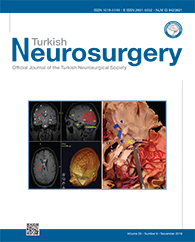2Diskapi Yildirim Beyazit Training and Research Hospital, Department of Neurosurgery, Ankara, Turkey
3Artvin State Hospital, Infectious Diseases Clinic, Artvin, Turkey
4Dr. Yasar Eryilmaz Dogubayazit State Hospital, Neurosurgery Clinic, Agri, Turkey DOI : 10.5137/1019-5149.JTN.25151-18.1 AIM: To analyse postoperative meningitis (POM) after craniotomy, and to compare the clinical characteristics, treatment outcomes and mortality rates of POM that were caused by Acinetobacter spp. or other possible causes.
MATERIAL and METHODS: In this study, POM cases in our hospital between 2008 and 2016 were retrospectively reviewed. Cases were divided into three groups; Acinetobacter spp. meningitis (case group), non-Acinetobacter bacterial meningitis (control group 1) and culture negative meningitis (control group 2). Demographic, clinical, laboratory features, treatment modalities and mortality rates were compared between case and control groups.
RESULTS: A total of 112 patients with POM were included in the study. Cerebrospinal fluid (CSF) culture results were negative in 50 (44.6%) patients; bacteria were isolated from CSF of 62 (55.3%) patients. Acinetobacter spp. was isolated from 28 (45%) patients, while bacteria other than Acinetobacter spp. were detected in 34 (55%) patients. No significant differences were observed between case and control groups in terms of age, gender, comorbidity and operation type. For the case group, change of treatment according to culture result was significantly different from control groups (p<0.001). Mortality was 55.6% in the case group, 24.2% in control group 1 (p=0.013), and 24% in control group 2 (p=0.006). In multivariate analysis, isolation of Acinetobacter spp. from CSF culture [ORadj5.2, 95% confidence interval (CI):1.2â22.0, p=0.026] and inappropriate treatment (ORadj15.7, 95%CI:3.6â68.9, p<0.001) were determined to be independent risk factors for mortality.
CONCLUSION: Postoperative meningitis, especially caused by Acinetobacter spp., and its inappropriate empirical treatment are associated with high mortality.
Keywords : Acinetobacter spp., Antimicrobial resistance, Empiric antibiotic treatment, Mortality, Postoperative meningitis




